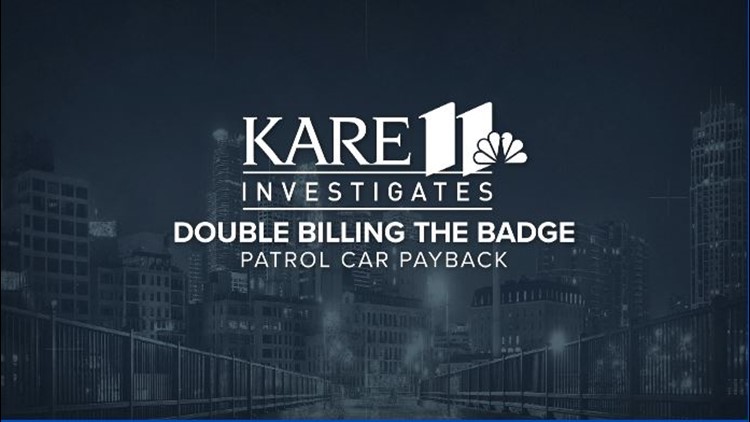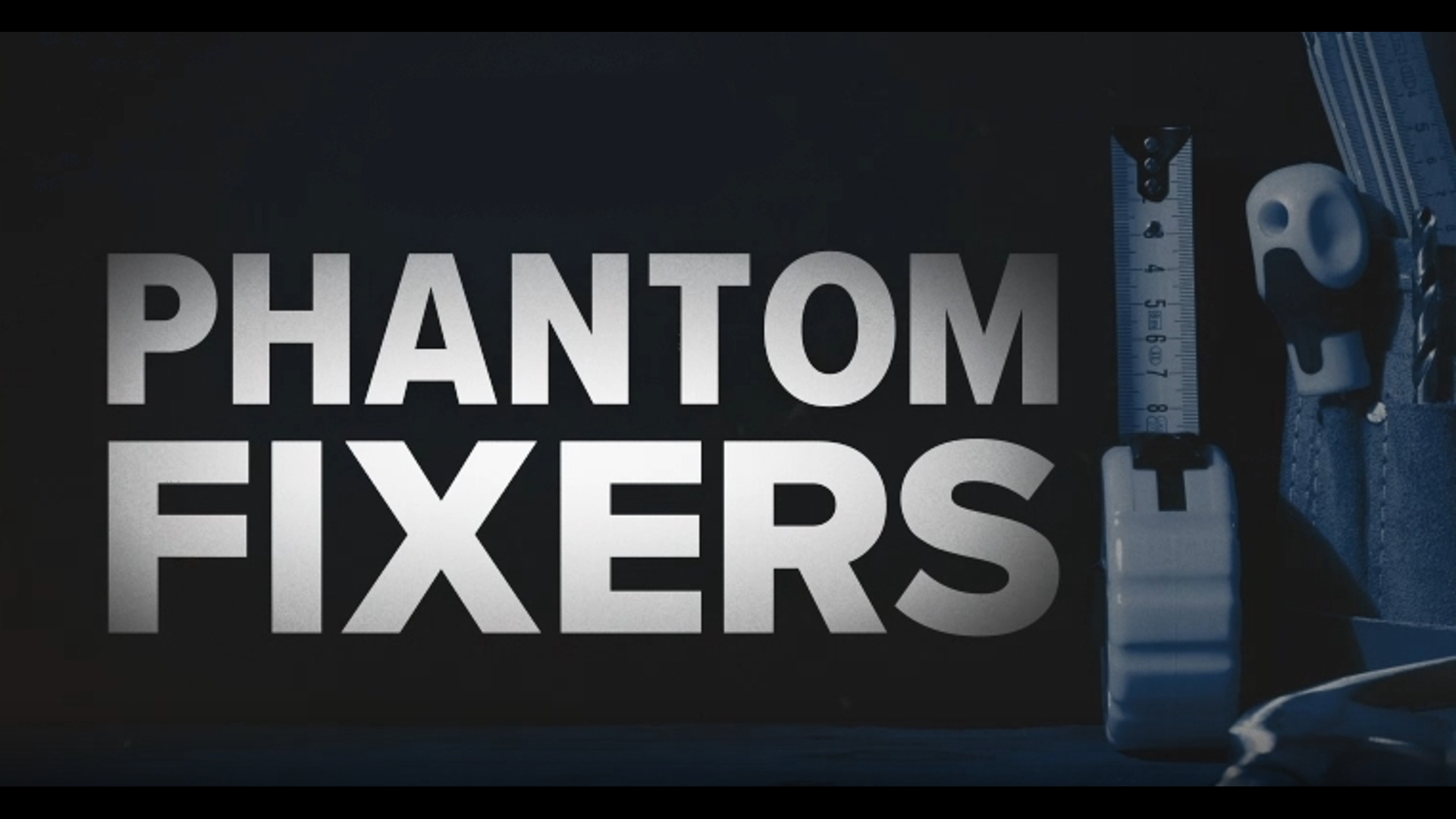This is the story of how taxpayers were ripped off while officials here in Minnesota were apparently asleep at the wheel.
They didn’t wake up until after KARE 11 began investigating the police car double billing scheme almost two years ago.
Since then, the man at the center of the swindle has been convicted of a felony.
More than three-quarters of a million dollars have been refunded to law enforcement agencies statewide.
And, as our on-going investigation has discovered, taxpayers may still be owed even more.
Overcharges state officials missed
Gerry Worner arrived at the Otter Tail County courthouse on a sunny day in May 2018.
The former fleet manager at Nelson Auto Center in Fergus Fall agreed to plead guilty in connection with a massive multi-year scheme to overcharge police and sheriff departments across Minnesota.

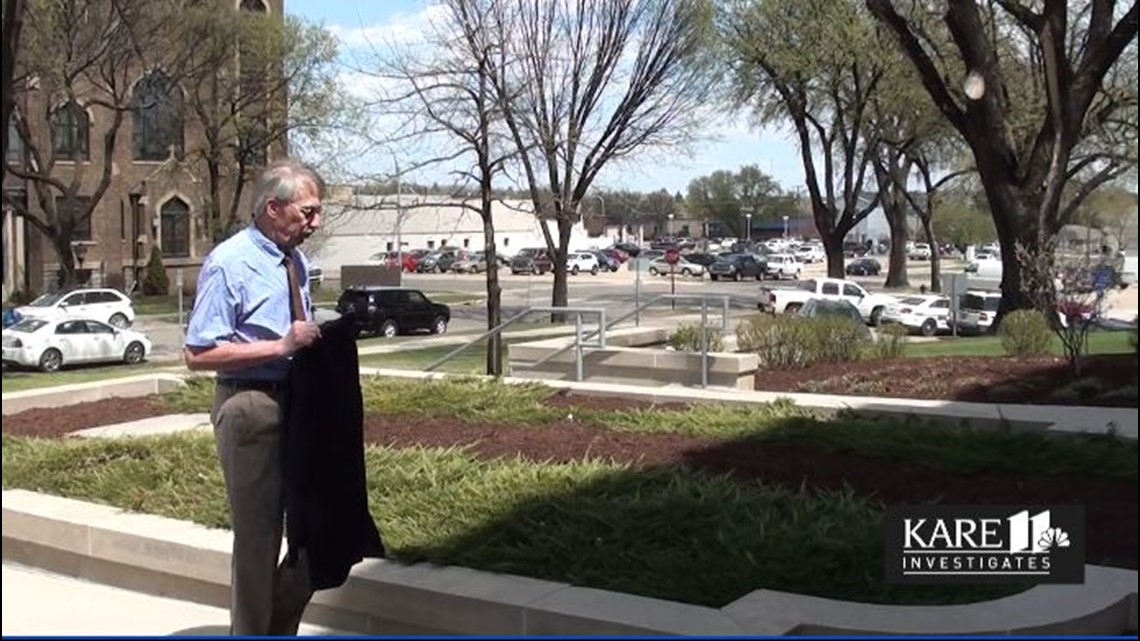
For years, that dealership held the state contract to sell Ford police SUVs in Minnesota.
“Certainly, restitution here is the goal for the state to make sure all the victims are compensated, brought back to whole,” said Michelle Eldien, the prosecutor who handled the theft by swindle case against Worner. “At this point the agreement included all dollars for all contracts.”
Just how much money is involved?
Dealership owner Brent Nelson told investigators in a recorded interview that Worner’s personal share was at least $325,000.
“I think the over costs were occurring because he wanted to put more money on the bottom line,” Nelson said. “He was basically making a 40 percent commission.”
In all, refund checks went out from Nelson Auto earlier this year totaling more than $803,000.
They were overcharges that state officials repeatedly missed until KARE 11 started crunching numbers and asking questions almost two years ago.
Hunt under the hood
It was April 2017 at the Maplewood police department and the hunt under the hood was on.
“It should be in the car, right?” asked a police department mechanic. “I’m not seeing one.”
He couldn’t find the engine block heater he was looking for.
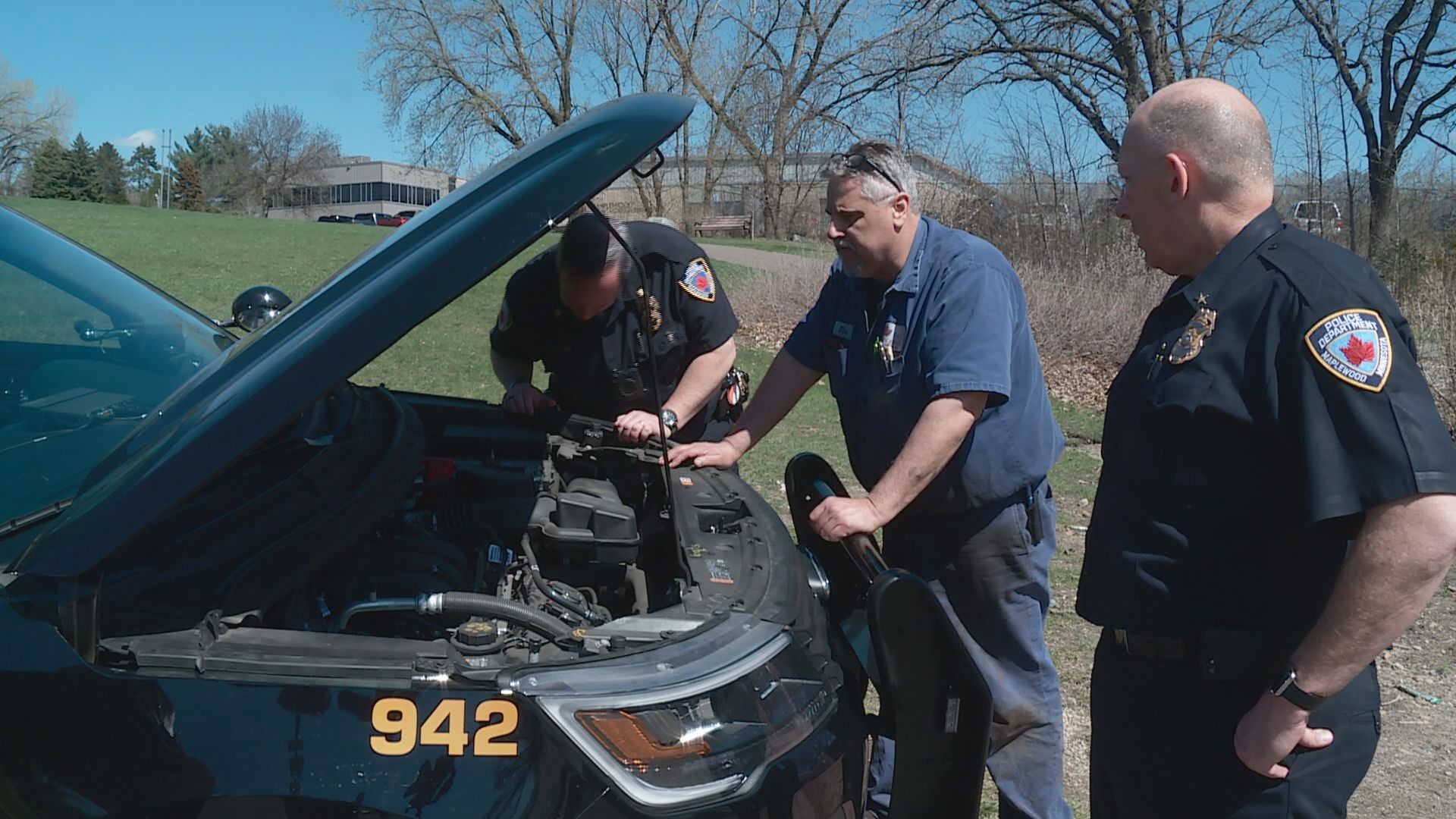
“We didn’t either,” said Police Chief Paul Schnell. “It’s not on the car.”
But records show Maplewood paid for an engine block heater.
That’s just one example KARE 11 found in an investigation that uncovered how Minnesota taxpayers were charged hundreds of thousands of dollars for features on police vehicles that either are not there – or in many cases were paid for twice.
The state contract for police SUVs spells out what must be included in the standard base package at the contracted price. The items include engine block heaters, spot lamps, heated mirrors and rear windows that can’t be rolled down from the backseat of squad cars.
But when KARE 11 went line-by-line over Maplewood’s police car purchases, we found they were charged an extra:
- $79 for engine block heaters
- $187 for the spot lamps
- $53 for heated mirrors
- $30 to make the rear windows inoperative.
“Based on the findings that you’ve uncovered here, we’ve paid for items as add-ons that were, or should have been included in the base price of the car,” said Chief Schnell.
“Double billed?” asked KARE 11 reporter A. J. Lagoe.
“Double billed,” Schnell replied.
A whistleblower's warning
To understand how KARE 11 exposed the double billing scheme, we’ll need to take you behind the scenes of our investigation.
It all started when we met with Steve Kleiber, a private citizen with both a law enforcement and vehicle purchasing background.
“You see what I was showing you?” Kleiber asked as he poured over copies of police car purchasing records.

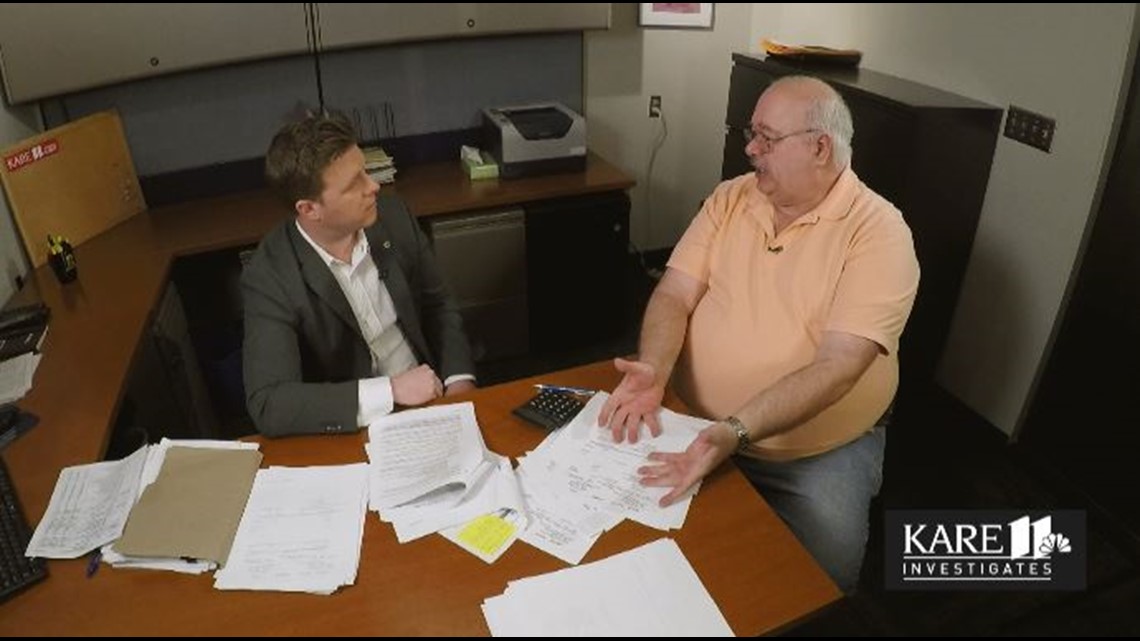
Steve claimed that back in 2015 he had discovered the St. Paul Police Department had been overcharged on some of their squad cars purchased from Nelson Auto using the state’s master contract. The department had been billed extra for spot lamps and heated mirrors that were supposed to be included in the base price of the vehicle.
“It’s pretty simple,” Kleiber explained. “They were supposed to provide in black and white, this is what we provide. Here’s the price. And they weren’t doing it.”
St. Paul took what Steve discovered and demanded a refund. So, Nelson Auto cut a check paying back more than $13,000.
Suspecting the same thing might be happening at other police departments, Steve Kleiber took what he’d found to State Patrol’s Vehicle Crimes Taskforce and the Department of Administration, the state agency which oversees the contract.
In an internal email about Kleiber’s tip, a state patrol investigator wrote: “It could be an interesting case. May be just a theft by swindle, but it involves the dealer who holds the state contract for vehicles—not just our vehicles, but many other divisions.”
But Steve says he was largely ignored by the investigators and the Department of Administration.
“My frustration level was pretty high,” Kleiber said, “because I took it to the people who I thought should deal with it and address the problem and basically nothing has happened.”
Nothing for two years.
So, Steve reached out to KARE 11 Investigates. And we were about to uncover a scheme that authorities now say overcharged taxpayers more than a million dollars.
Using public records requests, we started by auditing the SUV purchases of 20 different police and Sheriff’s departments.
We discovered every single one of them was double billed.
“It was probably a couple hundred dollars a car that we’re paying too much for,” said South St. Paul Police Chief William Messerich.

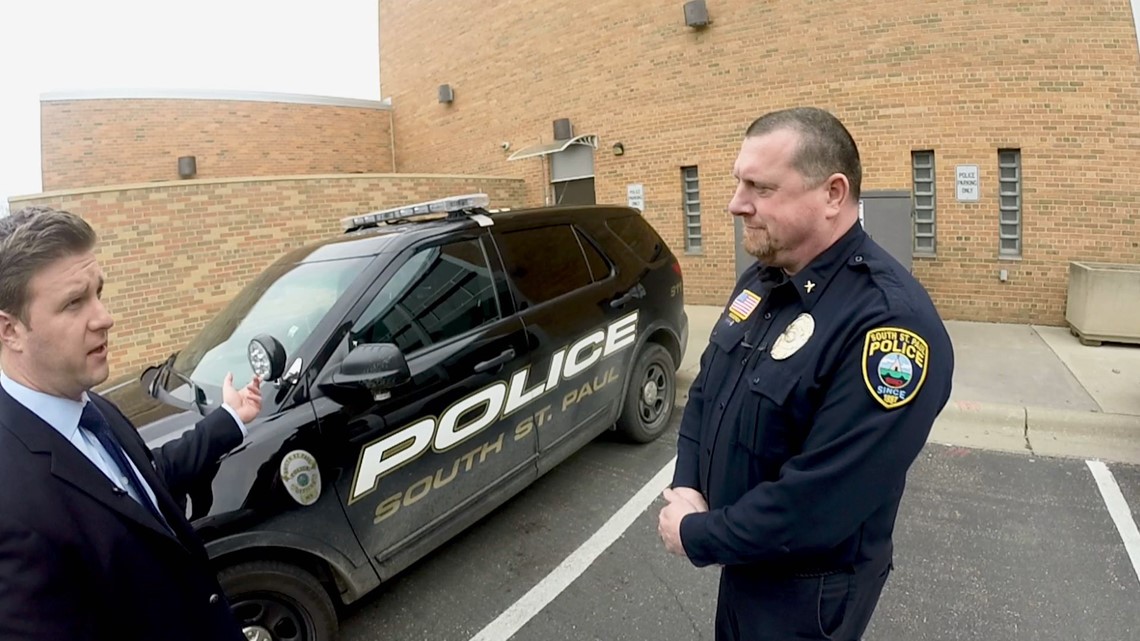
A couple hundred dollars per car may not sound like all that much. But consider the dealership that had the state contract sold 558 of the Ford police interceptor SUVs in one year alone.
That’s worth roughly $15 million. So, we’re talking real money here.
“I can’t imagine what the dollars could add up to. I can’t imagine,” Maplewood Chief Paul Schnell said at the time.
We discovered the double billing happening at police agencies big and small.
“Across the state of Minnesota, the taxpayers are paying for things that they aren’t getting,” said Curtis Haats, Director of Finance for the Hennepin County Public Works Department.
The man behind the scheme
When KARE 11 started investigating, the examples of double billing on police squad cars we found were all coming from the same dealership, Nelson Auto Center in Fergus Falls.
The point man for the sales was Fleet Manager Gerry Worner.
Gerry’s name was on all the double billed invoices we discovered.
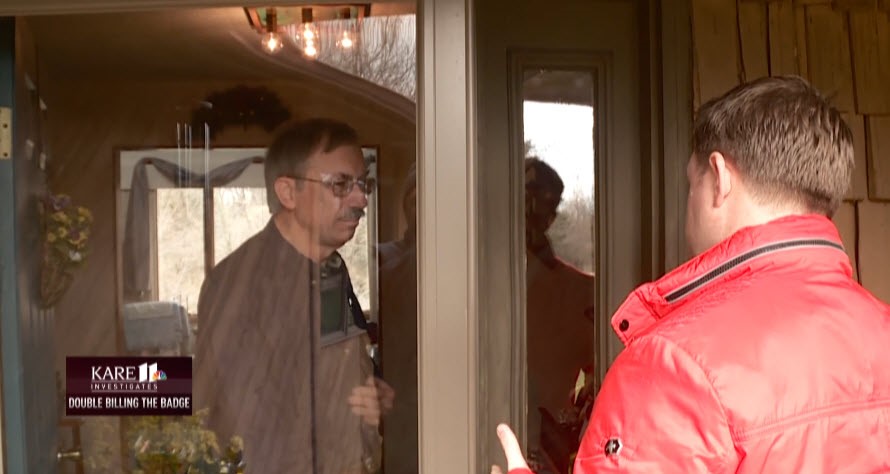
That’s why after emails to Worner went unreturned, investigative reporter A.J. Lagoe paid a visit in April 2017 to his 5,696-square foot riverfront home in Fergus Falls. Worner would not answer any questions when we knocked on his door.
Lagoe: “Mr. Worner, A.J. Lagoe, I’m from KARE 11 News. I wanted to talk with you about the double billing issue going on with the police vehicles.”
Worner: “No comment.”
Lagoe: “Well, this was going on a long time. Were you intentionally trying to rip off police departments?”
Worner: “No comment.”
Lagoe: “Were you incompetent, sir? Or are you a crook?
Worner closed the door without answering.
But before long, the state Bureau of Criminal Apprehension had launched its own investigation. By July 2017, Worner was officially charged with multiple counts of Theft by Swindle.
In court filings, investigators said they found evidence that 205 different agencies were overcharged between 2014 and 2017.
Since Worner made a 40 percent commission on all profits, the prosecutor said every overcharge put money in his pocket.
“Unfortunately, it went on for quite some time,” said Otter Tail County Attorney Michelle Eldien.
At first, Gerry Worner denied the charges. His attorney argued the double-billing was accidental. “There were mistakes made, but they were honest mistakes,” attorney Kent Marshall told KARE 11.
Were they just honest mistakes?
Two employees who worked for Worner in the Fleet Department at Nelson Auto told a different story in recorded interviews with BCA investigators.
“What Gerry did was try to make an extra buck whenever possible,” said one of the workers.
“Gerry, why do you think we can keep doing this?” another recalled asking Worner. “Why are you insisting that we keep doing this?”
Both employees told investigators they knew the overcharges were “morally wrong” and confronted Gerry Worner about them years ago.
“We’ve had the argument with him I don’t know how many times, I can’t tell you, because we felt it was wrong – like I morally felt like this is not right. He just ignored us, I mean basically,” one of the employees said.
According to the criminal charges, the double billing continued.
“This appears to be a case of misplaced trust in a state vendor?” asked reporter Lagoe.
“I would say a huge misplaced trust, unfortunately,” prosecutor Eldien replied.
Dealership owners not charged
Although Gerry Worner was charged, the dealership owners were not. Brent and Laurel Nelson said they had no knowledge of – and didn’t approve – the overcharges.
“None of us had any knowledge of this,” Brent Nelson told the BCA in a recorded interview.
In fact, the BCA recordings show the owners cooperated with the investigation.
“I’m sick with what happened here totally,” Nelson said.
The owners said they launched an internal review which found widespread improper billing, so they fired Gerry Worner. They told investigators he took 100 percent responsibility.
“Worner basically came in and said, ‘Listen I’ve done some things wrong … There’s double billings,’” Brent Nelson told the BCA.
Once the double billing was confirmed, the state cancelled Nelson Auto’s multimillion-dollar contract for Ford SUV police vehicles.
“I’m angry. This is – this is a very frustrating experience to have had a state contract taken advantage of like this,” Commissioner Matt Massman of the Minnesota Department of Administration said at the time.

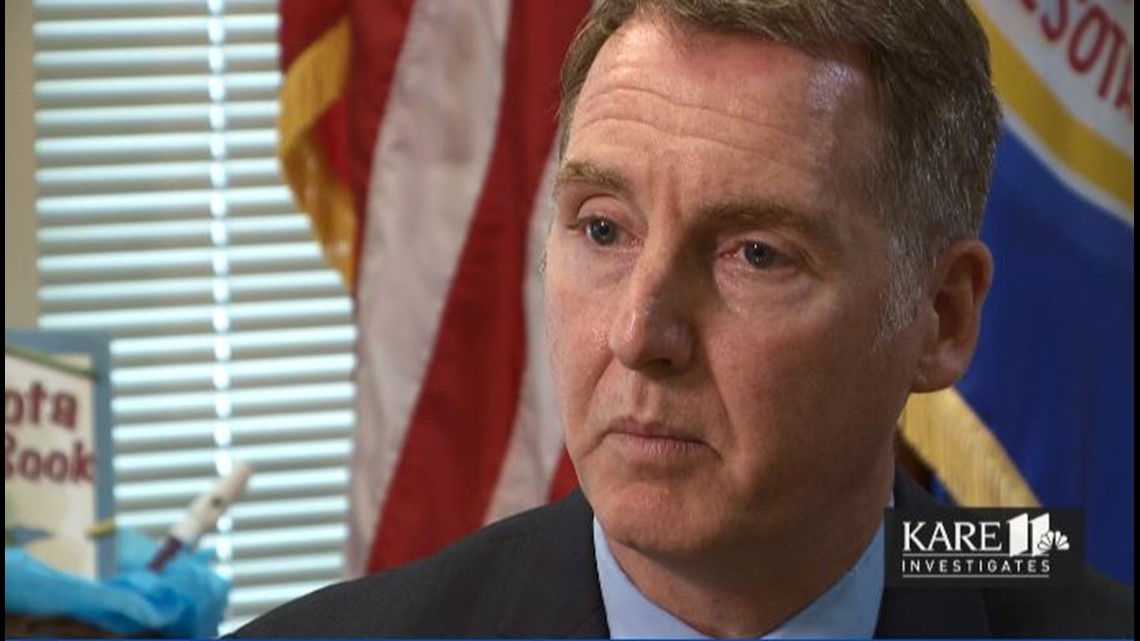
“You’ve stripped the state vendor of the contract to sell police vehicles?” asked KARE 11’s Lagoe.
“Yeah, we did that in April as we became aware of the breadth and scope of the fraudulent activity that was going on here.”
KARE 11 also found double billing on other state police car contracts that Nelson Auto had – including the contract for specially equipped Dodge Chargers.
So, the Department of Administration launched an expanded audit of Nelson Auto’s sales.
In all, the audit found that from 2010 to 2017, Nelson Auto overcharged law enforcement by $803,309 on 3,225 different police vehicles sold to more than 200 agencies.
The Bureau of Criminal Apprehension and State Patrol fell victim, along with State Corrections, the DNR, six tribal governments, Regions Hospital, Metro Transit, the Metropolitan Airport Commission, and city police and county sheriff’s departments across the state.
“Obviously the biggest surprise was that someone had the audacity to try overcharging law enforcement,” said Curt Yoakum, Assistant Commissioner of the Department of Administration.
The dealership’s owners promised to make full refunds to all the ripped off police agencies.
“We’re absolutely going to cut those checks back to the people,” owner Brent Nelson told investigators at the time.
But KARE 11’s investigation did not end – even when those refund checks started going out.
Overcharges the state audit missed
By early 2018, Nelson Auto Center was sending out refund checks to individual law enforcement agencies statewide. In all, more than three-quarters of a million dollars.

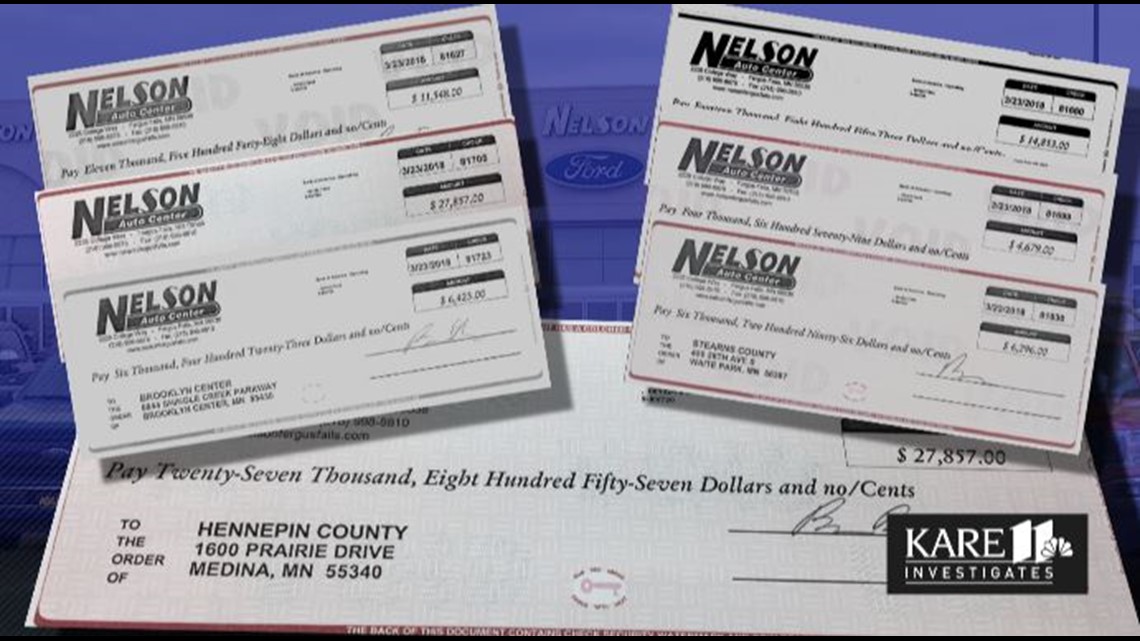
But KARE 11 was about to raise serious questions about whether the State audit missed hundreds of thousands of dollars in other taxpayer overcharges.
“These numbers don’t match,” said Steve Kleiber. “Not even close!”
Kleiber is the man who helped KARE 11 uncover the double billing scheme almost two years ago.
After the state completed its audit, KARE 11 made an ‘Open Records’ request for copies of some of the invoices investigators had obtained from Nelson Auto. Never before seen by the public, the invoices show what Ford charged the dealership for a car and then what the dealership charged police.
Since Kleiber had a background in both fleet sales and law enforcement, KARE 11 asked him to review the invoices we obtained.
“Can you tell us based on these invoices what the profit made by Nelson Auto was?” reporter A. J. Lagoe asked.
“So, they made a total of $1,143.87 profit on this one vehicle,” Kleiber said after crunching the numbers for an SUV sold to St. Louis Park.
That’s significant because Nelson Auto won the state contract by saying it would make a fixed profit of just $224.94 per SUV. It’s called the “Total Bid Constant” or “TBC” and the contract defines it as “all dealer profit."
KARE 11 wanted an outside expert to review what we’d found, so we took Nelson Auto’s contract and all the amendments to Mark Becker, a private attorney specializing in government purchasing contracts.
“What’s the legal definition of ‘all profit’?” Lagoe asked.
“It really does mean what it says,” Becker replied. “I mean ‘all’ means ‘all’ and it’s as easy as that.”
But time after time, when we asked Steve Kleiber to examine the actual invoices he discovered Nelson Auto was making much more than $224.94.
“$1,253.80,” Kleiber said after reviewing the invoices for a different police car.
Lagoe: “That’s what they made in profit off the one vehicle?”
Kleiber: “One vehicle.”
Some of that excess profit is due to the original double billing issues KARE 11 exposed. But the invoices revealed other problems state officials apparently missed.
KARE 11 discovered that in 2017 Nelson Auto tripled its profit on some sales. It got the state to amend the contract because Ford was increasing prices. But records show Nelson pre-ordered cars, paying Ford at the old price level then billing police departments like Rosemount at the new higher price.
That gave Nelson an extra $750 profit per car the state did not know about until KARE 11 told them.
“It’s definitely not within the spirit of the contract,” said Assistant Commissioner Curt Yoakum.
Despite that concern, Yoakum told us the state had agreed to contract amendments to reflect a higher base price from Ford. In doing so, he said that $225 “Total Bid Constant" – the cap on dealer profit – went out the window despite what the contract actually says.
Lagoe: “Even though the amendment says all prices, terms and conditions remain unchanged, they changed?
Yoakum: “On that amendment, yes.”
But after the state dug a little further into those pre-ordered cars, they discovered more problems and changed their tune. The state concluded the pre-order tactic by Nelson Auto resulted in some police agencies not getting vehicles equipped the way they were ordered.
So, in June 2018, the Department of Administration fired off a letter to Nelson Auto. It says, “Nelson’s deviation from the structure and intent of the contract resulted in a monetary windfall … was detrimental to law enforcement …” and that “The State is seeking reimbursement” for the difference in price on 279 vehicles.
That’s at least $209,250.
But, so far, Nelson Auto’s owner is refusing to pay. In an email, Brent Nelson told the state the practice was legal and demanded that “this issue be submitted to arbitration or put in the court system for resolution."
Government's price concession error
But that’s not the only contract issue KARE 11 found.
There’s the so-called ‘Government Price Concession” or GPC, a discount Ford gives dealers when they sell to government agencies.
Records show Nelson told the state it was $2,900, but the invoices reveal they actually were getting $3,056 from Ford.
That’s an extra $156 per car on 2,396 sales. It adds up to more than $373,000.
The contract says any increase to the GPC money “must be immediately passed on to the state.” But the Department of Administration said it was not.
“Did at any point Nelson Auto inform the state that they were getting more money from Ford on the GPC?” asked KARE 11’s Lagoe.
“They did not,” said Assistant Commissioner Yoakum.
After KARE 11’s discovery, the state sent a letter to Nelson Auto calling the GPC issue a “Potential Contract Violation.”
Dealership owner Brent Nelson replied, acknowledging the discrepancy. But he said the “overpayment” was Ford’s mistake – and that Ford, rather than taxpayers, should get the $373,000 back.
“They’ve made the claim that that is money owed to them,” Yoakum explained.
Ford declined comment, saying GPC’s are “a proprietary arrangement.”
Hidden holdback
And, finally, as KARE 11 continued to analyze the invoices, we discovered what Steve Kleiber calls a hidden holdback.
“On the St. Louis Park car it’s $232,” Kleiber explained.
He says the "holdback" is an extra four percent discount from Ford the dealer pocketed on factory-installed optional equipment like air conditioning and rearview cameras.
“You’d be making more on the options than what you’re supposed to make in profit on the entire vehicle,” Kleiber told KARE 11.
The contract says dealers were required to submit a printout of optional equipment listing the “lowest manufacturer to dealer price available.”
It goes on to say that if there’s an “additional percent deduction” for dealers, it must be indicated and given to the state.
“That has to be disclosed to the state and passed along,” said Mark Becker, the attorney KARE 11 asked to review Nelson Auto’s contract with the state.
“Has to?” asked Lagoe.
“Well, that’s what the contract says,” Becker replied
But the state says it wasn’t told about that hidden holdback either.
Lagoe: “Was any percent deduction disclosed to the state?”
Yoakum: “No.”
The amounts can differ from car to car depending on which options were ordered, but Steve Kleiber estimates that extra discounts could total hundreds of thousands of dollars.
Lagoe: “Money that you believe belongs to taxpayers?”
Kleiber: “Yes. Absolutely. According to the contract.”
But on that point, the Department of Administration doesn’t think there’s a contract violation. In the long run, the state argues that allowing a little flexibility on profit encourages more bidders and greater competition.
“It also was never our intention to completely eliminate profit from the options,” Yoakum told KARE 11.
In the eyes of both a contract attorney and a fleet sales expert, however, Minnesota taxpayers were being taken for a ride.
“That’s not the way I read the contract,” said Becker.
“The cities and counties are trusting them to do the right thing and getting them the best price,” said Kleiber. “Obviously that didn’t happen here!”
Reforms underway
State officials now acknowledge they should have spotted the double billing scheme much earlier.
“What happened is, we misdiagnosed the warning bells if you will,” Department of Administration Commissioner Matt Massman told KARE 11.
In the wake of KARE 11’s investigation, Massman instituted a new fraud investigation policy and hired a compliance expert to review state contracts for abuses.
“Frankly, to deter any potential vendor from, you know, doing something similar on another state contract,” Massman said.
But some lawmakers aren’t satisfied.
“They’ve said it was taken care of, then something else happens,” said State Representative Sarah Anderson, the chairwoman of the State Government Finance Committee.
Anderson says she’s frustrated that even after KARE 11’s original reports about double billing, the department still missed other overcharges.
“Obviously the taxpayer is getting fleeced,” she said. Anderson called for legislative hearings next year.
Meanwhile, the state continued to find additional overcharges involving so-called Package Pricing.

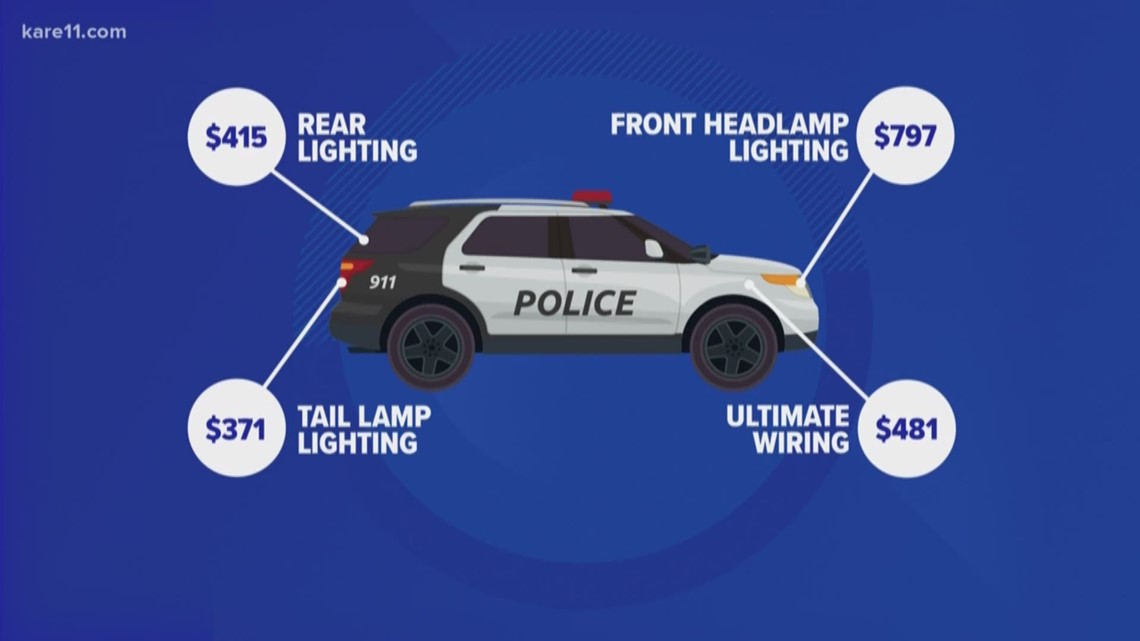
Hennepin County bought an SUV for the sheriff’s department that included the “Ready For The Road Package” priced and sold for $2,979.
But Hennepin was also charged:
- $797 for front headlamp lighting
- $371 for tail lamp lighting
- $415 for rear lighting
- $481 for Ultimate Wiring
All four of those features were already included in the Ready for the Road Package. The state calculates the package pricing overcharges on just that one vehicle cost Hennepin county an extra $2,109.

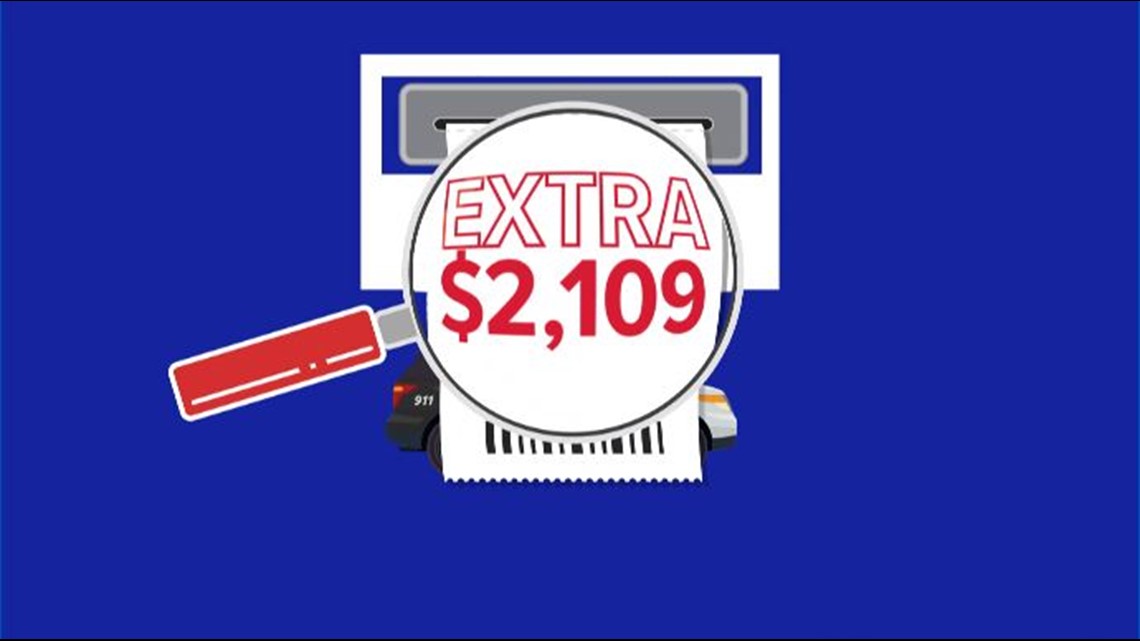
In the wake of that finding, the Department of Administration ordered a new audit to look for similar overcharges. Meanwhile, state officials told us they plan to go after hundreds of thousands in additional refunds Nelson Auto is still disputing involving those pre-ordered cars.
And what about Gerry Worner, the man behind the cop car rip-off?
Like many white-collar criminals, he cut a plea deal. He was sentenced to 30 days in jail and five years on probation.
He also paid back his share of more than a million dollars Nelson Auto has already refunded.
For the dealership employees who tried to warn Gerry Worner years ago, it means their nightmare is finally over.
“It’s been a lot of pressure for a lot of years,” one employee told investigators. “I felt like I had to be part of something I didn’t want to be.”
If you want to blow the whistle on government waste or corruption or know about something else we should investigate, email us at: Investigations@kare 11.com


